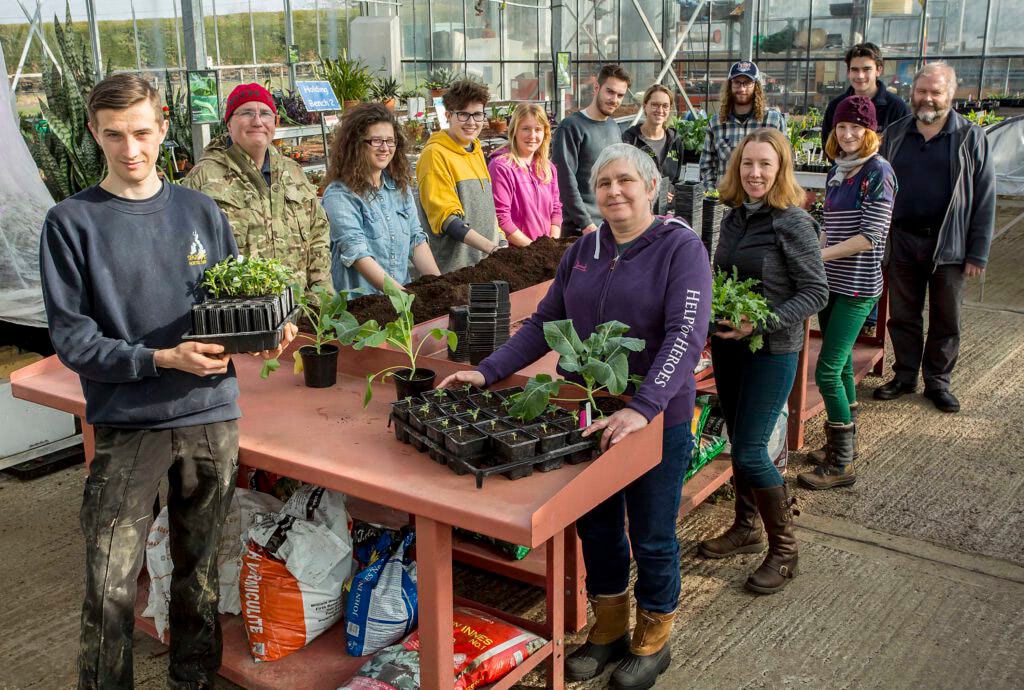Students and Veterans work together to create RHS Chelsea Flower Show Garden

Sparsholt College and the charity Help for Heroes have announced their partnership for RHS Chelsea Flower Show 2018. Their garden, The Force for Good, will tell the powerful story of the role horticulture plays in the recovery and ongoing support of injured British Armed Forces personnel and their families.
Individual stories are told through the three elements of the garden as the team of college and former-military gardeners inform visitors of the journey from injury or illness through to recovery and beyond.
The Force for Good garden is a demonstration of how horticulture has given these individuals a second chance at life and how everyone can benefit from its therapeutic benefits.
Sparsholt College’s Horticulture students are working collaboratively with their Help for Heroes counterparts to design and create The Force for Good, a garden of three different sections.
The students were inspired by conversations at the Help for Heroes Recovery Centre, Tedworth House in Wiltshire where those being supported by the charity take part in gardening activities.
The positioning and grouping of plants in the ‘Surviving’ section of the garden will show the disorientation, conflicting emotions and mental state of those being supported by Help for Heroes before they enter any recovery programme.
As they progress through their journey to ‘Stability’, the garden will portray a number of horticultural activities undertaken at the four Recovery Centres nationwide with a focus on crop production and horticulture skills.
The third and final section of the garden ‘Support’ will show how planting and landscaping, including a still pool and seating, can create an area promoting recovery and ongoing support. The stage when an individual becomes an active member of their community again, and can make a positive impact in society once more.
The garden will engage all of its visitors’ senses, using relevant sound tracks in each section. White noise will help convey chaos and confusion, natural sounds will give a sense of nature and the outdoors and a symphonic piece of music, composed especially for Help for Heroes, will provide the backdrop to peace, calm and relaxation.
Sparsholt College’s lecturer, horticulture and garden design expert Chris Bird is leading the student team:
“RHS Chelsea Flower Show is the most famous show of its kind and whether you are an experienced, high-profile designer or just getting started in a horticulture career, it is an incredible, career-enhancing experience. We are very proud to be working alongside Help for Heroes to share the powerful stories of those the charity supports, whilst showcasing the therapeutic and restorative benefits gardening has for health and wellbeing.”
At least one in four people in the population will be affected by mental health issues in any one year and horticulture has been shown to help recovery and general mental wellbeing (Review of nature-based interventions for mental health care by Natural England). Working with plants and flowers or simply experiencing a beautiful green space can improve health and wellbeing, aid rehabilitation, reduce depression, anxiety and stress-related symptoms while also helping to improve self-esteem, confidence and mood. Gardening can positively impact a local community by bringing people together. Elements of The Force for Good garden will be re-homed following RHS Chelsea 2018, will be donated to community groups helping more people to learn, grow and heal through gardening.
Lucy Thorpe, Horticultural Therapist at Help for Heroes said:
“We are delighted that Sparsholt College students chose to focus on the recovery journey of wounded, injured and sick service personnel and veterans. We have seen first-hand how horticulture and nature courses have empowered Veterans. In some cases, this has led to those we support achieving a City and Guilds qualification and going onto study further RHS courses at Sparsholt college.”
Health and wellbeing benefits linked to green spaces and horticulture
- Psychological restoration and increased general mental wellbeing
- Reduction in depression, anxiety and stress related symptoms
- Improvement in dementia-related symptoms
- Improved self-esteem, confidence and mood
- Increased attentional capacity and cognition
- Improved happiness, satisfaction and quality of life
- Sense of peace, calm or relaxation
- Feelings of safety and security
- Increased social contact, inclusion and sense of belonging
- Increase in work skills, meaningful activity and personal achievement











Responses